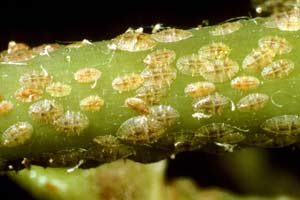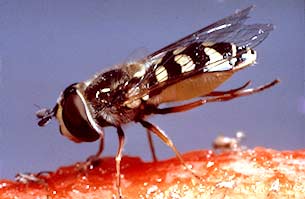Oil and soap provide low impact control
 |
Oil and Soap can do the job!Both oil and soap act to disrupt the cell membranes of the insect which results in its death. As such, they are good general poisons and will be hard for insects to become resistant to. This also means they are broad spectrum inseticides that are toxic to almost all invertebrates that they contact directly. The oils, as a group, are usually refered to as horticultural oils; some examples of commercial products are Sun Spray® and Safe-T-Cide®. An example of an insecticidal soap is M-Pede®. Once in the soil, however, they are quickly neutralized and lose their effectiveness on the foliage once they dry. Although they can kill almost any insect they contact, this rapid loss of effectiveness makes oil and soap two of the insecticides we most prefer since they have no long term residual activity, which is a common property of the older nerve toxin insecticides such as Malathion. This is important because any predator or parasite that lands on the plant after the oil or soap has dried will be able to search for pest insects without dying from the insecticide residues. Short residual materials such as oil and soap are better for the ecology too, since predators in the egg stage or pupal stage are usually protected from them, as are parasite larvae inside the host. When these biocontrol agents hatch, they are ready to provide pest control and re-establish the balance between predator and prey. We want you to find out every way you can to control pests without spraying, however, if you've come to the point where you must spray the plants to protect their health, oil and soap are the first materials to use. |
 |
Soaps and oils have some potential to damage plantsBoth oils and soaps also thin or remove the waxy layer that covers the leaves and protect the plant from dessication. Manufacturers test candidate products for efficacy against the pest but also they test for the harm it causes the plant, called phytotoxicity. Using a product that is sold as an insecticide is much more likely to assure that your plants are not damaged than using a household soap. That said, for many plants, dishwashing liquid will do the trick. Like any new product, it is always a good idea to test the product before you need it on a few kinds of plants to check for any phytotoxic effects. You should follow the label directions for mixing and applying an insecticide. For soaps and oils, we've found that a rate of about 1% makes an effective spray. This is about 1.25 ounces (or 2.5 tablespoons) per gallon of water. In general the spray is more effective if the water you use is warm (~75 - 90 Deg. F.). One caveat with soap and oil is that applying them when temperatures exceed 95 degrees F can cause phytotoxicity to plants that would otherwise have no problem. Also the Links page has a collection of other sites that can help you create and maintain you garden, so be sure to pursue this resource. |

